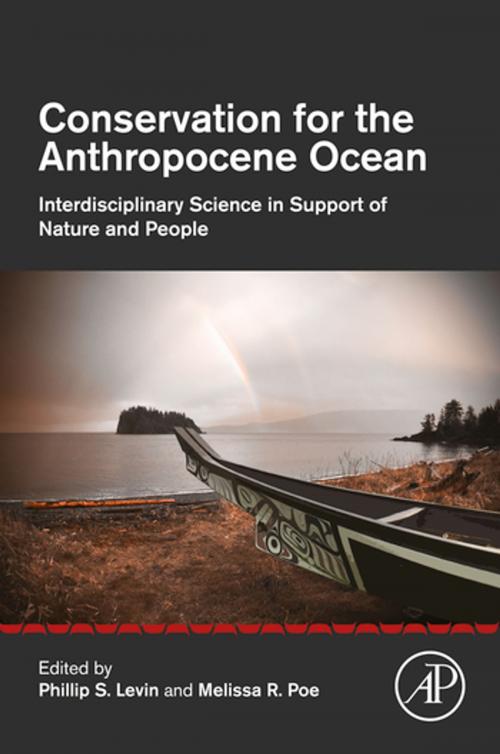Conservation for the Anthropocene Ocean
Interdisciplinary Science in Support of Nature and People
Nonfiction, Health & Well Being, Medical, Ailments & Diseases, Infectious Diseases, Parasitology, Medical Science, Pharmacology| Author: | ISBN: | 9780128092989 | |
| Publisher: | Elsevier Science | Publication: | June 1, 2017 |
| Imprint: | Academic Press | Language: | English |
| Author: | |
| ISBN: | 9780128092989 |
| Publisher: | Elsevier Science |
| Publication: | June 1, 2017 |
| Imprint: | Academic Press |
| Language: | English |
Conservation for the Anthropocene Ocean: Interdisciplinary Science in Support of Nature and People emphasizes strategies to better connect the practice of marine conservation with the needs and priorities of a growing global human population. It conceptualizes nature and people as part of shared ecosystems, with interdisciplinary methodologies and science-based applications for coupled sustainability.
A central challenge facing conservation is the development of practical means for addressing the interconnectedness of ecosystem health and human well-being, advancing the fundamental interdisciplinary science that underlies conservation practice, and implementing this science in decisions to manage, preserve, and restore ocean ecosystems.
Though humans have intentionally and unintentionally reshaped their environments for thousands of years, the scale and scope of human influence upon the oceans in the Anthropocene is unprecedented. Ocean science has increased our knowledge of the threats and impacts to ecological integrity, yet the unique scale and scope of changes increases uncertainty about responses of dynamic socio-ecological systems. Thus, to understand and protect the biodiversity of the ocean and ameliorate the negative impacts of ocean change on people, it is critical to understand human beliefs, values, behaviors, and impacts. Conversely, on a human-dominated planet, it is impossible to understand and address human well-being and chart a course for sustainable use of the oceans without understanding the implications of environmental change for human societies that depend on marine ecosystems and resources.
This work therefore presents a timely, needed, and interdisciplinary approach to the conservation of our oceans.
- Helps marine conservation scientists apply principles from oceanography, ecology, anthropology, economics, political science, and other natural and social sciences to manage and preserve marine biodiversity
- Facilitates understanding of how and why social and environmental processes are coupled in the quest to achieve healthy and sustainable oceans
- Uses a combination of expository material, practical approaches, and forward-looking theoretical discussions to enhance value for readers as they consider conservation research, management and planning
Conservation for the Anthropocene Ocean: Interdisciplinary Science in Support of Nature and People emphasizes strategies to better connect the practice of marine conservation with the needs and priorities of a growing global human population. It conceptualizes nature and people as part of shared ecosystems, with interdisciplinary methodologies and science-based applications for coupled sustainability.
A central challenge facing conservation is the development of practical means for addressing the interconnectedness of ecosystem health and human well-being, advancing the fundamental interdisciplinary science that underlies conservation practice, and implementing this science in decisions to manage, preserve, and restore ocean ecosystems.
Though humans have intentionally and unintentionally reshaped their environments for thousands of years, the scale and scope of human influence upon the oceans in the Anthropocene is unprecedented. Ocean science has increased our knowledge of the threats and impacts to ecological integrity, yet the unique scale and scope of changes increases uncertainty about responses of dynamic socio-ecological systems. Thus, to understand and protect the biodiversity of the ocean and ameliorate the negative impacts of ocean change on people, it is critical to understand human beliefs, values, behaviors, and impacts. Conversely, on a human-dominated planet, it is impossible to understand and address human well-being and chart a course for sustainable use of the oceans without understanding the implications of environmental change for human societies that depend on marine ecosystems and resources.
This work therefore presents a timely, needed, and interdisciplinary approach to the conservation of our oceans.
- Helps marine conservation scientists apply principles from oceanography, ecology, anthropology, economics, political science, and other natural and social sciences to manage and preserve marine biodiversity
- Facilitates understanding of how and why social and environmental processes are coupled in the quest to achieve healthy and sustainable oceans
- Uses a combination of expository material, practical approaches, and forward-looking theoretical discussions to enhance value for readers as they consider conservation research, management and planning















